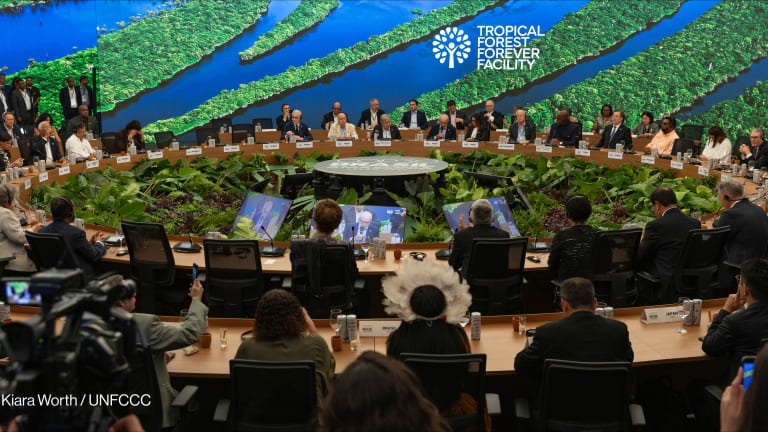
EDITOR’S NOTE: A portion of the 2.9 billion pounds International Climate Fund will be used to reduce emissions from deforestation and degradation, and one of the suggestions is to use the money as payment to countries based on their performance of certain readiness activities such as creating institutional structures to develop carbon monitoring, reporting and verification, notes Kristy Graham, research officer at the Overseas Development Institute. The U.K. government should consider several issues should it decide to opt for payment for performance based solely on carbon emissions, she adds.
Of the £2.9 billion designated as an International Climate Fund, the UK Government must decide how to spend the money earmarked for forests. To help with this decision, a report has been commissioned to explore how the UK can make the most impact with this finance, particularly by providing a leadership role in REDD+ (Reducing Emissions from Deforestation and Forest Degradation). But with the Fund objectives covering climate change mitigation, poverty alleviation and biodiversity conservation, the question is: make the most impact on what?
The report – Funding for forests: government support for REDD+– suggests that bilateral relationships are a good way to complement existing investment in multilateral funds, and focuses on ‘payments for performance’ as a way to ensure that these bilateral relationships deliver results quickly, at scale and ensure value for money. But what the report fails to do is to define what these measures of performance might be, and how they will or should relate to the stated objectives of the funding.
Paying a country based on its undertaking of certain readiness activities – e.g. setting up institutional structures to develop carbon monitoring, reporting and verification (MRV) systems, or developing a REDD+ strategy or nationally appropriate guidance for implementing safeguards – makes sense given the stage that most countries are at in the process of REDD+ readiness (although exactly what this process entails is also undefined).
If instead the ‘payments for performance’ relate to payments made for verifiable reductions in greenhouse gas emissions from forests – which in international REDD+ discussions is the meaning of this term – there are a number of issues that need to be considered first:
Many countries (particularly the poorest, e.g. most countries in Africa) do not currently have the institutional and governance structures in place for REDD+. Moving straight to paying for performance without getting these structures right will threaten the long-term sustainability of REDD+ in these countries and disadvantage their ongoing participation. Without this support, it is hard to see how poverty reduction objectives of the funding can be achieved.
The main drivers of deforestation are outside of forests and are driven by the policies, governance and economics of other sectors. If REDD+ is to be truly transformational it needs to move on from project-scale pilot implementation dealing only with forest industries or small areas and start addressing deforestation driven by sectors such as agriculture and energy. However, given the complexity of the relationships between changes in these sectors and pressure on forests, large-scale experimentation is vital to see what kind of interventions work and how, as well as how to ensure that socio-economic impacts are appropriately mitigated.
This learning is an essential part of Phase 2 of REDD+ under the Cancun Agreements, and comes before Phase 3 (performance based payments) for good reason. Basing payments on performance before establishing what kinds of policies work will discourage experimentation with these large-scale policy initiatives and will force countries to be more risk averse in their chosen implementation of REDD+. In order to ensure that at least some emissions reductions are achieved, it is likely that countries will stick to well established forestry sector interventions, which, although important, will not provide the scale of emissions reductions needed in most countries or generate knowledge of how to tackle the big drivers of deforestation.
Payment for performance based solely on carbon emissions reductions is unlikely to achieve the objectives of poverty alleviation and biodiversity conservation. There will be tradeoffs in achieving all of these, so it is essential that the social and biodiversity impacts of REDD+ policy interventions are assessed to better understand these tradeoffs and improve strategy and policy design.
Payment for performance is a central idea of the international REDD+ framework, and one which is imperative in creating an incentive for real action. But moving to this stage too fast has the potential to reduce both innovation in tackling the major drivers of deforestation and learning to catalyse transformational change. The opportunity is there for the UK Government to provide real REDD+ leadership – but it is essential that we don’t miss out a crucial step, and first establish what works and why.
Re-published with permission by the Overseas Development Institute. Visit the original article.








